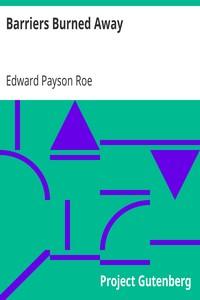Read this ebook for free! No credit card needed, absolutely nothing to pay.
Words: 80535 in 11 pages
This is an ebook sharing website. You can read the uploaded ebooks for free here. No credit cards needed, nothing to pay. If you want to own a digital copy of the ebook, or want to read offline with your favorite ebook-reader, then you can choose to buy and download the ebook.
THE COMING OF THE FRIARS.
When King Richard of England, whom men call the Lion-hearted, was wasting his time at Messina, after his boisterous fashion, in the winter of 1190, he heard of the fame of Abbot Joachim, and sent for that renowned personage, that he might hear from his own lips the words of prophecy and their interpretation.
Though King Richard, in the strange interview of which contemporary historians have left us a curious narrative, exhibited much more of the spirit of the scoffer than of the convert, and evidently had no faith in Abbott Joachim's theories and his mission, it was otherwise with the world at large. At the close of the twelfth century a very general belief, the result of a true instinct, pervaded all classes that European society was passing through a tremendous crisis, that the dawn of a new era, or, as they phrased it, "the end of all things" was at hand.
The Abbot Joachim was only the spokesman of his age who was lucky enough to get a hearing. He spoke a language that was a jargon of rhapsody, but he spoke vaguely of terrors, and perils, and earthquakes, and thunderings, the day of wrath; and because he spoke so darkly men listened all the more eagerly, for there was a vague anticipation of the breaking up of the great waters, and that things that had been heretofore could not continue as they were.
The other idea, of men and women weary of the hard struggle with sin, and fleeing from the wrath to come, joining together to give themselves up to the higher life, out of the reach of temptation and safe from the witcheries of Mammon,--that too was a grand idea, and not unfrequently it had been carried out grandly. But the monk was nothing and did nothing for the townsman; he fled away to his solitude; the rapture of silent adoration was his joy and exceeding great reward; his nights and days might be spent in praise and prayer, sometimes in study and research, sometimes in battling with the powers of darkness and ignorance, sometimes in throwing himself heart and soul into art which it was easy to persuade himself he was doing only for the glory of God; but all this must go on far away from the busy haunts of men, certainly not within earshot of the multitude. Moreover the monk was, by birth, education, and sympathy, one with the upper classes. What were the rabble to him? In return the townsmen hated him cordially, as a supercilious aristocrat and Pharisee, with the guile and greed of the Scribe and lawyer superadded.
Eight years before King Richard was in Sicily a child had been born in the thriving town of Assisi, thirteen miles from Perugia, who was destined to be one of the great movers of the world. Giovanni Bernardone was the son of a wealthy merchant at Assisi, and from all that appears an only child. He was from infancy intended for a mercantile career, nor does he seem to have felt any dislike to it. One story--and it is as probable as the other--accounts for his name Francesco by assuring us that he earned it by his unusual familiarity with the French language, acquired during his residence in France while managing his father's business. The new name clung to him; the old baptismal name was dropped; posterity has almost forgotten that it was ever imposed. From the mass of tradition and personal recollections that have come down to us from so many different sources it is not always easy to decide when we are dealing with pure invention of pious fraud, and when with mere exaggeration of actual fact, but it scarcely admits of doubt that the young merchant of Assisi was engaged in trade and commerce till his twenty-fourth year, living in the main as others live, but perhaps early conspicuous for aiming at a loftier ideal than that of his everyday associates, and characterized by the devout and ardent temperament essential to the religious reformer. It was in the year 1206 that he became a changed man. He fell ill--he lay at Death's door. From the languor and delirium he recovered but slowly--when he did recover old things had passed away; behold! all things had become new. From this time Giovanni Bernardone passes out of sight, and from the ashes of a dead past, from the seed which has withered that the new life might germinate and fructify, Francis--why grudge to call him Saint Francis?--of Assisi rises.
Very early the young man had shown a taste for Church restoration. The material fabric of the houses of God in the land could not but exhibit the decay of living faith; the churches were falling into ruins. The little chapel of St. Mary and the Angels at Assisi was in a scandalous condition of decay. It troubled the heart of the young pietist profoundly to see the Christian church squalid and tottering to its fall while within sight of it was the Roman temple in which men had worshipped the idols. There it stood, as it had stood for a thousand years--as it stands to this day. Oh, shame! that Christian men should build so slightly while the heathen built so strongly!
To the little squalid ruin St. Francis came time and again, and poured out his heart, perplexed and sad; and there, we are told, God met him and a voice said, "Go, and build my church again." It was a "thought beyond his thought," and with the straightforward simplicity of his nature he accepted the message in its literal sense and at once set about obeying it as he understood it.
He began by giving all he could lay his hands on to provide funds for the work. His own resources exhausted, he applied for contributions to all who came in his way. His father became alarmed at his son's excessive liberality and the consequences that might ensue from his strange recklessness; it is even said that he turned him out of doors; it seems that the commercial partnership was cancelled: it is certain that the son was compelled to make some great renunciation of wealth, and that his private means were seriously restricted. That a man of business should be blind to the preciousness of money was a sufficient proof then, as now, that he must be mad.
O ye wary men of the world, bristling with the shrewdest of maxims, bursting with the lessons of experience, ye of the cool heads and the cold grey eyes, ye whom the statesman loves, and the tradesman trusts, cautious, sagacious, prudent; when the rumbling of the earthquake tells us that the foundations of the earth are out of course, we must look for deliverance to other than you! A grain of enthusiasm is of mightier force than a million tons of wisdom such as yours; then when the hour of the great upheaval has arrived, and things can no longer be kept going!
Knocking at his heart--not merely buzzing in his brain--the words kept smiting him, "Provide neither gold nor silver nor brass in your purses, neither scrip for your journey, neither two coats, nor yet staves, for the workman is worthy of his meat!" Once men had changed the face of the world with no other equipment. Faith then had removed mountains. Why not again? He threw away his staff and shoes; he went forth with literally a single garment; he was girt with a common rope round his loins. He no more doubted of his mission, he no more feared for the morrow than he feared for the young ravens that he loved and spake to in an ecstasy of joy.
Henceforth there was "not a bird upon the tree but half forgave his being human;" the flowers of the field looked out at him with special greetings, the wolf of the mountains met him with no fierce glare in his eye. Great men smiled at the craze of the monomaniac. Old men shook their grey heads and remembered that they themselves had been young and foolish. Practical men would not waste their words upon the folly of the thing. Rich men, serenely confident of their position, affirmed that they knew of only one who could overcome the world--to wit, the veritable hero, he who holds the purse-strings. St. Francis did not speak to these. "Oh, ye miserable, helpless, and despairing; ye who find yourselves so unutterably forlorn--so very, very far astray; ye lost souls whom Satan has bound through the long weary years; ye of the broken hearts, bowed down and crushed; ye with your wasted bodies loathsome to every sense, to whom life is torture and whom death will not deliver; ye whose very nearness by the wayside makes the traveller as he passes shudder with uncontrollable horror lest your breath should light upon his garments, look! I am poor as you--I am one of yourselves. Christ, the very Christ of God, has sent me with a message to you. Listen!"
Free books android app tbrJar TBR JAR Read Free books online gutenberg
More posts by @FreeBooks

: Myths and Legends of Our Own Land — Volume 08 : on the Pacific Slope by Skinner Charles M Charles Montgomery - Folklore United States


: Myths and Legends of Our Own Land — Volume 07 : Along the Rocky Range by Skinner Charles M Charles Montgomery - Folklore United States






